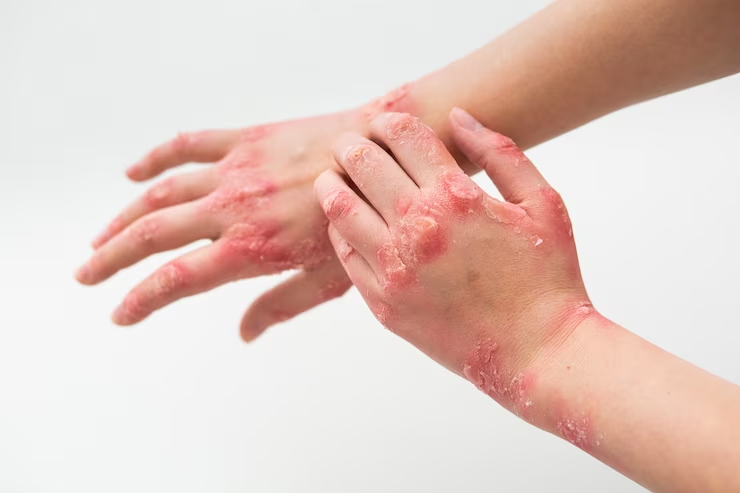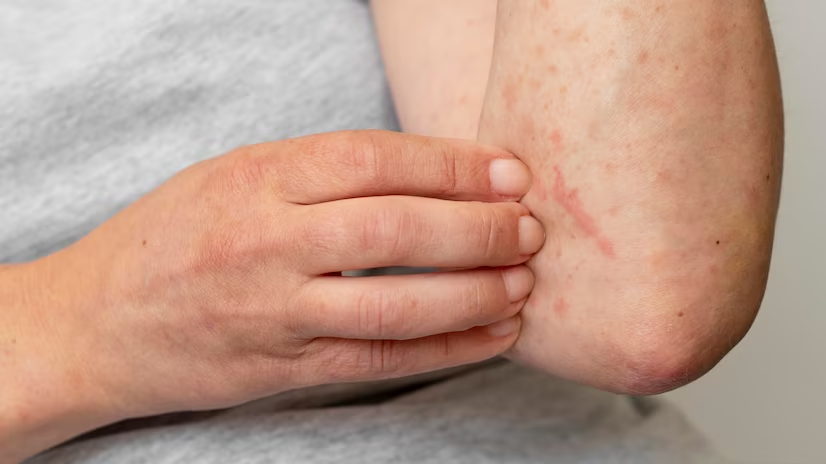
Eczema, a chronic skin condition characterized by inflammation and intense itching, affects millions worldwide. If you or someone you know is living with eczema, you may have wondered, "Can eczema spread?" Understanding the nature of eczema and its potential to spread is essential for effectively managing and treating this condition. In this blog post, we will delve into the intricacies of eczema and explore whether it can spread from one part of the body to another or even from person to person.
By debunking myths and providing insights into the factors contributing to eczema's spread, we aim to equip you with the knowledge needed to navigate this condition confidently. So, let's dive in and uncover the truth about whether eczema can spread.
What is Eczema?
[Eczema](https://www.mayoclinic.org/diseases-conditions/atopic-dermatitis-eczema/symptoms-causes/syc-20353273#:~:text=Atopic%20dermatitis%20(eczema), also known as dermatitis, is a chronic inflammatory skin condition that affects people of all ages. Dry, itchy, and inflamed patches of skin characterize it. Eczema can manifest in different forms, the most common atopic dermatitis.
Atopic dermatitis is often associated with a personal or family history of allergies, asthma, or hay fever. It typically begins in infancy or childhood and may persist into adulthood. The exact cause of eczema is not fully understood, but it is believed to result from genetic and environmental factors.
Causes of Eczema

The exact cause of eczema has yet to be fully understood. It is believed to result from genetic, immune system, and environmental factors. Here are some key factors that contribute to the development of eczema:
Genetic Predisposition
: Eczema tends to run in families, indicating a genetic predisposition to the condition. Certain gene variations can affect the skin's barrier function and immune response, making individuals more susceptible to eczema.Immune System Dysfunction
: Eczema is associated with immune system abnormalities. People with eczema have an overactive immune response to certain triggers, such as allergens or irritants. This heightened immune response leads to inflammation and the characteristic symptoms of eczema.Environmental Triggers
: Various environmental factors can trigger or worsen eczema symptoms. These triggers can vary from person to person, but common ones include:Allergens
: Substances like pollen, pet dander, dust mites, mold, or certain foods can trigger an allergic response and exacerbate eczema symptoms.Irritants
: Chemicals, such as harsh soaps, detergents, fragrances, and certain fabrics, can irritate the skin and lead to eczema flare-ups.Climate
: Extreme temperatures, high humidity, dry air, or rapid changes in weather conditions can trigger eczema symptoms.Stress
: Emotional stress, anxiety, or other psychological factors can contribute to eczema flare-ups or worsen symptoms.
Skin Barrier Dysfunction
: The outermost layer of the skin acts as a protective barrier. In individuals with eczema, this barrier is impaired, allowing moisture to escape and irritants or allergens to penetrate the skin more easily. The compromised skin barrier also makes it harder for the skin to retain moisture, leading to dryness and further inflammation.Microbial Factors
: Bacterial, viral, or fungal infections can affect eczema. Staphylococcus aureus, a common bacterium on the skin, can cause or worsen eczema symptoms. Certain viruses and fungi can also infect eczema-affected skin, leading to complications and worsening symptoms.Symptoms of Eczema

Eczema presents a variety of symptoms that can vary in intensity and appearance depending on the individual and the specific type of eczema. Here are some common symptoms associated with eczema:
Itching
: One of the hallmark symptoms of eczema is intense itching. The affected skin often feels itchy, leading to scratching and further aggravation.Redness and Inflammation
: Eczema patches typically appear red or pink due to inflammation. The affected areas may also become swollen and warm to the touch. Dryness and Scaling: Eczema-prone skin tends to be dry and may appear rough or scaly. The affected areas can feel rough and may develop small cracks or fissures.Blisters and Oozing
: In some cases, eczema can form small, fluid-filled blisters. These blisters may eventually burst, resulting in the oozing or weeping of clear fluid.Thickened Skin
: Prolonged and repeated scratching or rubbing of the affected areas can cause the skin to thicken over time. This thickening, known as lichenification, can make the skin feel leathery or rough.Skin Discoloration
: Chronic eczema can cause changes in skin pigmentation. The affected areas may become lighter or darker than the surrounding skin.Sensitivity
: Eczema-prone skin is often more sensitive and reactive. It may react strongly to irritants, allergens, or certain fabrics, increasing symptoms.Secondary Infections
: Scratching the itchy skin can break the skin barrier, making it more susceptible to bacterial, viral, or fungal infections. Signs of infection include increased redness, swelling, pus, and pain.Can eczema spread from one part of the body to another?
Eczema is not contagious, which means it cannot spread from one person to another through direct contact. It is important to clarify any misconceptions about eczema being a contagious condition. You cannot "catch" eczema from someone else, and it is not caused by a fungus, virus, or bacteria that can be transmitted to others.
Instead, eczema has a genetic component, and individuals with a family history of eczema, asthma, or seasonal allergies may have a higher risk of developing the condition. While family history can be a risk factor, eczema is not contagious.
How does eczema spread?

Eczema can indeed spread to different parts of the body, but the spread occurs as a result of local factors and not through direct contact with others. Let's explore how eczema spreads:
Self-inoculation
: When an individual with eczema scratches an itchy area, the fingernails can introduce bacteria or irritants to nearby unaffected areas. This can lead to the development of new eczema patches in those areas.Koebner phenomenon
: Some individuals with eczema may experience the [Koebner phenomenon](https://www.ncbi.nlm.nih.gov/books/NBK553108/#:~:text=The%20Koebner%20phenomenon%20(KP), where new eczema patches develop at skin trauma or injury sites. This can occur due to scratching, rubbing, or any other form of skin irritation.Skin barrier disruption
: Eczema-affected skin often has a compromised barrier function, making it more susceptible to environmental triggers and irritants. When the skin barrier is damaged, it becomes easier for inflammation and symptoms to spread to adjacent areas.How to Treat Eczema
When it comes to treating eczema, it's important to address both the symptoms and the prevention of its spread. Here are key strategies to consider:

Moisturize
: Regularly moisturize your skin to prevent dryness and maintain its barrier function. Look for fragrance-free, hypoallergenic moisturizers.Avoid triggers
: Identify and avoid triggers that worsen your eczema symptoms. Common triggers include certain fabrics, harsh soaps, allergens, and stress.Gentle cleansing
: Use mild, non-irritating cleansers and avoid hot water when washing your skin. Pat dry instead of rubbing.Topical treatments
: Apply prescribed topical creams or ointments to manage inflammation and itching. These may include corticosteroids, calcineurin inhibitors, or other anti-inflammatory agents.Antihistamines
: Oral antihistamines can help relieve itching and promote better sleep. Consult your healthcare provider for appropriate options.Wet wrap therapy
: For severe flare-ups, wet wrap therapy can provide additional relief. It involves applying moisturizers and wet dressings to the affected areas.Preventing the Spread of Eczema
While eczema is not contagious, it can spread within an individual's body due to various factors. However, you can take measures to prevent or minimize the spread of eczema. Here are some tips:
Avoid scratching
Itchy skin is a common symptom of eczema, but scratching can worsen the condition and contribute to its spread. Keep your nails short and try to resist the urge to scratch. Use gentle tapping or apply a cold compress to alleviate itchiness if needed.
Practice proper skincare
Establish a regular skincare routine to maintain the health of your skin. Use mild, fragrance-free cleansers and moisturizers to keep the skin hydrated and minimize dryness. Avoid harsh soaps, detergents, and products that contain potential irritants.
Moisturize regularly
Moisturizing is crucial for managing eczema and preventing its spread. Apply moisturizers immediately after bathing or showering to lock in moisture and restore the skin barrier. Opt for fragrance-free and hypoallergenic moisturizers that suit your skin type.
Identify and avoid triggers
Pay attention to factors that worsen your eczema symptoms and try to avoid them. Common triggers include certain fabrics, extreme temperatures, allergens, and stress. Identifying and minimizing exposure to these triggers can help prevent flare-ups and limit the spread of eczema.
Seek medical advice
Consult a healthcare professional or dermatologist for proper diagnosis and personalized treatment. They can help identify triggers, prescribe appropriate medications or topical creams, and provide guidance on managing your eczema effectively.
Manage stress
Stress can trigger or exacerbate eczema symptoms. Find healthy ways to manage stress, such as practicing relaxation techniques, exercising regularly, or seeking support from friends, family, or professional counselors. You can reduce the frequency and intensity of eczema flare-ups by reducing stress levels.
When To Seek Medical Help
If you have eczema, monitoring your condition and seeking medical help when necessary is important. While the condition is not contagious, understanding the question "How does eczema spread?" within your body can help you determine when to consult a healthcare professional. Here are some situations where seeking medical help is recommended:
Severe symptoms
: If your eczema symptoms become severe, causing significant discomfort, pain, or interfering with your daily activities and quality of life, it's advisable to seek medical attention. Severe symptoms may include intense itching, widespread inflammation, extensive skin involvement, or persistent oozing and crusting.Infection
: Eczema-affected skin is more susceptible to bacterial, viral, or fungal infections. You must consult a healthcare professional promptly if you notice signs of infection, such as increased redness, swelling, warmth, pain, pus, or fever. They can evaluate the infection and provide appropriate treatment, such as antibiotics or antiviral medications.Failure to respond to self-care measures
: If you have been consistently following proper skincare routines, avoiding triggers, and using over-the-counter treatments, but your eczema symptoms persist, worsen, or spread despite these efforts, it's recommended to seek medical help. A healthcare professional can assess your condition, prescribe stronger medications or recommend alternative treatments based on your needs.Emotional impact
: Eczema can have a significant emotional impact, leading to increased stress, anxiety, or decreased self-esteem. If your eczema is taking a toll on your mental well-being or causing emotional distress, it's important to contact a healthcare professional who can provide support and recommend appropriate resources or therapies.Conclusion
It is important to understand that while eczema can spread within an individual's body, it is not contagious and cannot be transmitted from person to person. Factors such as scratching, skin damage, and secondary infections can contribute to the spread of eczema.
However, with proper skincare, avoidance of triggers, and seeking medical advice when needed, you can minimize the spread and severity of eczema symptoms. Remember, eczema management is personalized, and what works for one person may not work for another. By staying informed, adopting preventive measures, and seeking professional guidance, you can effectively manage eczema and improve your skin health and overall well-being.












